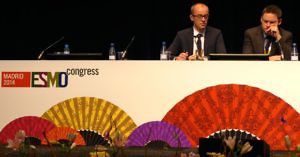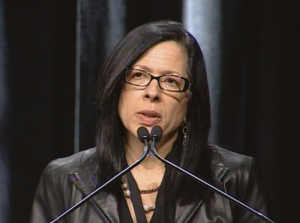Breathing New Life into Bladder Cancer Treatment
 Cancer immunotherapy, the ability to harness the body’s own immune system to fight cancer, is showing early promise in bladder cancer.
Cancer immunotherapy, the ability to harness the body’s own immune system to fight cancer, is showing early promise in bladder cancer.
“Breathing new life into bladder cancer treatment” was the title of the excellent discussion by Maria De Dantis (Vienna) of data presented at the recent ESMO Congress in Madrid.
Advanced bladder cancer has a particularly poor prognosis. Once the cancer has spread in the body, according to Cancer Research UK, the average survival time is approximately a year to 18 months.
There is clearly an unmet medical need for effective new treatments, with no major treatment advances for over 30 years. To date, targeted agents in the second-line setting have shown only incremental progression free survival and generally low overall response rates.
Which is why it’s exciting to see hope for patients with urothelial bladder cancer from new inhibitors of the PD-1 immune checkpoint signalling pathway.
At ASCO this year, data for Roche/Genentech’s anti PD-L1 (MPDL3280A) was presented (Abstract 5011) by Thomas Powles (Barts, London). Commenting on the data, in her post “Making a difference in advanced bladder cancer” Sally noted, “it wouldn’t have been out of place in the Plenary session, frankly.”
Recognizing the potential based on the promise of the early clinical data, on May 31st the US Food and Drug Administration (FDA) granted Breakthrough Therapy Designation (BTD) to MPDL3280A in bladder cancer.
 If you need to catch up on immuno-oncology, we have a growing library of posts on Biotech Strategy Blog, and we’ll be continuing our coverage of the rapid progress in this area at the forthcoming annual meeting of the Society for Immunotherapy of Cancer (SITC), which takes place at National Harbor, MD from Nov 6 -9.
If you need to catch up on immuno-oncology, we have a growing library of posts on Biotech Strategy Blog, and we’ll be continuing our coverage of the rapid progress in this area at the forthcoming annual meeting of the Society for Immunotherapy of Cancer (SITC), which takes place at National Harbor, MD from Nov 6 -9.
At ESMO 2014, phase 1 clinical trial data in bladder cancer was presented for both Pembrolizumab (Merck) and MPDL3280A (Roche/Genentech).
Subscribers can login in to read more about how the two drugs compared in this indication.
This content is restricted to subscribers
